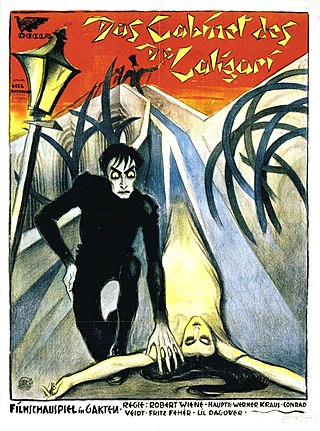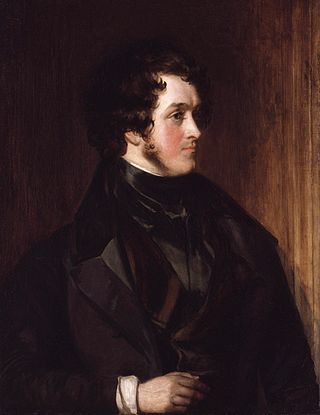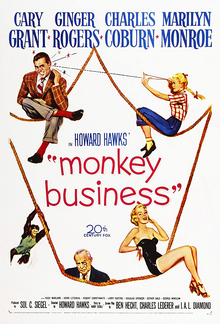
The Cabinet of Dr. Caligari is a 1920 German silent horror film, directed by Robert Wiene and written by Hans Janowitz and Carl Mayer. Considered the quintessential work of German Expressionist cinema, it tells the story of an insane hypnotist who uses a brainwashed somnambulist to commit murders. The film features a dark and twisted visual style, with sharp-pointed forms, oblique and curving lines, structures and landscapes that lean and twist in unusual angles, and shadows and streaks of light painted directly onto the sets.

William Harrison Ainsworth was an English historical novelist born at King Street in Manchester. He trained as a lawyer, but the legal profession held no attraction for him. While completing his legal studies in London he met the publisher John Ebers, at that time manager of the King's Theatre, Haymarket. Ebers introduced Ainsworth to literary and dramatic circles, and to his daughter, who became Ainsworth's wife.

A potion is a liquid "that contains medicine, poison, or something that is supposed to have magic powers." It derives from the Latin word potio which refers to a drink or the act of drinking. The term philtre is also used, often specifically for a love potion, a potion that is supposed to create feelings of love or attraction in the one who drinks it. Throughout history there have been several types of potions for a range of purposes. Reasons for taking potions ranged from curing an illness, to securing immortality to trying to induce love. These potions, while often ineffective or poisonous, occasionally had some degree of medicinal success depending on what they sought to fix and the type and amount of ingredients used. Some popular ingredients used in potions across history include Spanish fly, nightshade plants, cannabis, and opium.

L'elisir d'amore is a melodramma giocoso in two acts by the Italian composer Gaetano Donizetti. Felice Romani wrote the Italian libretto, after Eugène Scribe's libretto for Daniel Auber's Le philtre (1831). The opera premiered on 12 May 1832 at the Teatro della Canobbiana in Milan.

The Alchymist's Cat is a dark fantasy novel for children by British author Robin Jarvis. It is the first book in The Deptford Histories trilogy, a series of prequels to Jarvis's Deptford Mice books. Set in 17th century London, it serves as a backstory for the original trilogy's main antagonist, Jupiter. It was first published in the United Kingdom in 1991 by Macdonald Young Books. In 2004, it was published in the United States by Chronicle Books as The Alchemist's Cat.

The elixir of life, also known as elixir of immortality, is a potion that supposedly grants the drinker eternal life and/or eternal youth. This elixir was also said to cure all diseases. Alchemists in various ages and cultures sought the means of formulating the elixir.
The Cabaret of Dr Caligari was a BBC Radio 4 comedy series first broadcast in November and December 1991. It was written by Alan Gilbey, and produced by Anne Edyvean.

Simplicius is an operetta by Johann Strauss II. It was conceived from the work of HJC von Grimmelhausen titled Der abenteuerliche Simplicissimus or simply Adventurous Simplicissimus, which was opined by many to be the 17th century's greatest German novel. The libretto for this work was furnished by Victor Léon who was one of Vienna's promising talents of that era.

Monkey Business is a 1952 American screwball comedy film directed by Howard Hawks and starring Cary Grant, Ginger Rogers, Charles Coburn, and Marilyn Monroe. To avoid confusion with the unrelated 1931 Marx Brothers film of the same name, this film is sometimes referred to as Howard Hawks' Monkey Business.

The Mummy, or Ramses the Damned is a 1989 horror novel by American writer Anne Rice. Taking place during the early twentieth century, it follows the collision between a British archeologist's family and a resurrected mummy. The novel ends with the statement, "The Adventures of Ramses the Damned Shall Continue", and twenty-eight years later, Rice fulfilled this promise with Ramses the Damned: The Passion of Cleopatra, written in collaboration with her son, novelist Christopher Rice. A third jointly-authored novel in this series, Ramses the Damned: The Reign of Osiris, was released on February 1, 2022, two months after Anne Rice's death.

The Myth is a 2005 Hong Kong—Chinese martial arts fantasy-adventure film directed by Stanley Tong, starring Jackie Chan, Tony Leung Ka-fai, Kim Hee-sun, and Mallika Sherawat.

Docks of New York is a 1945 film directed by Wallace Fox and starring the East Side Kids.

Elixier is a German musical that premiered in 1997 in Leipzig, Germany under the direction of Horst Königstein. The music was written by Tobias Künzel and Wolfgang Lenk, with lyrics by Kati Naumann.

Wanderlust is a fantasy novel set in the Dragonlance campaign setting of the Dungeons & Dragons fantasy role-playing game.

Ripley's Believe It or Not!: The Riddle of Master Lu is a point and click adventure game based on Robert Ripley, the creator of Ripley's Believe It or Not!. It was developed and published by Sanctuary Woods in 1995.
Sir William Yelverton KB was a judge in Norfolk, England and twice a member of parliament for Great Yarmouth, Norfolk.

Neverland is a fantasy miniseries that aired on the Syfy network on December 4 and 5, 2011, and Sky Movies on December 9 and 16 December on Zee Cinema (India), written and directed by Nick Willing. It is a prequel to the story of Peter Pan.
"7:15 A.M." is the tenth episode of the American fairy tale/drama television series Once Upon a Time. The series takes place in the fictional seaside town of Storybrooke, Maine, in which the residents are actually characters from various fairy tales that were transported to the "real world" town by a powerful curse. In this episode, Emma Swan and Regina Mills become suspicious of the Stranger and his visit to Storybrooke, while David and Mary Margaret's feelings for each other grow, which parallels with Prince James' (Dallas) search for Snow (Goodwin) after he falls for her.

Seven Deaths in the Cat's Eye is a 1973 Gothic horror film directed by Antonio Margheriti. It is also a rare example of an Italian giallo that is set in period, taking place some time in the 1890s.

The Pink Panther: Hokus Pokus Pink is a musical adventure computer game for the PC released on October 18, 1997 by Wanderlust Interactive. It is based on the 1990s television series The Pink Panther, in which the traditionally non-speaking title character speaks audibly, and is a sequel to The Pink Panther: Passport to Peril. Like its predecessor, it teaches players about six countries as the Pink Panther explores them to solve a mystery. The places Pink visits are: Siberia in Russia, the Dead Sea in Israel, Indonesia, Borneo, Kenya, and Ancient Greece.

















